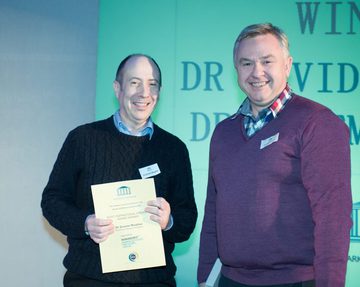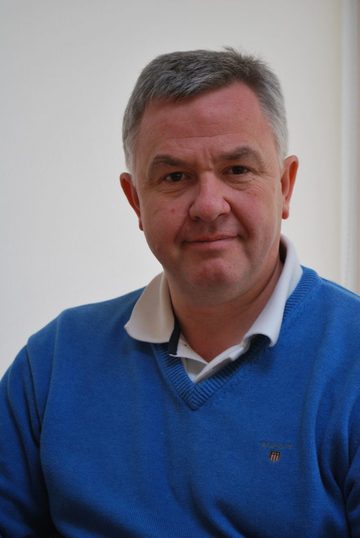Founding faculty – Dr David Stewart: Proud to be part of the revolution in care
News
Dr David Stewart with Dr Graeme Macphee, 2013
In the mid-nineties, Parkinson’s was a niche area of care. It wasn’t a core disease area for either geriatricians or neurologists, and the services and management offered to people with Parkinson’s reflected that.
Dr David Stewart, a consultant physician in Medicine for the Elderly in Glasgow, saw the need for something to support people living with Parkinson’s and, although he realised it was seen as a bit of an odd move to some of his colleagues, established a specialist clinic.
Elsewhere in the country, a few other consultants, working in neurology or Medicine for the Elderly, were finding the same need and setting up services too; the first Parkinson’s-specific services in the UK. At a meeting in 2001 for registrars at the end of their training called ‘I want to be a consultant’ some of these few all happened to be there, and began to talk.
These few were David, Doug MacMahon and Peter Fletcher – all Care of the Elderly physicians, and Sue Thomas, whose background in nursing and neurology had led to her working in policy at the Royal College of Nursing (RCN) at the time. Over an informal chat they agreed that there were not enough Parkinson’s services, and that a good way to encourage more would be to share examples of what was already working. They were also concerned that the ‘specialist’ Parkinson’s services were often not really run by a ‘specialist’ and thought that upskilling these consultants with a deeper understanding of the complex condition would make a big difference to care on the ground.
David personally wanted to see a way for professionals to share examples of good services and how they were working, and to drive up standards of care for people with Parkinson’s. He and the three other founders developed a course which still covers both in-depth clinical education and practical sessions about developing effective services. Over the past decade this course – the Parkinson’s MasterClass – has been a key part of what David terms a ‘revolution in care’.

Dr David Stewart, 2010
‘Parkinson’s has made a journey from being completely niche, to being a core part of training,’ he says, proud that the MasterClass has been part of that journey. The MasterClass foundation course recently doubled its capacity to allow for the volume of registrars who want to take the course as part of their rotation, demonstrating the integral part that the course plays in educating future specialists.
‘Parkinson’s is a legitimate sub-specialty for both neurologists and geriatricians,’ David points out. ‘That’s a real achievement.’
As for David’s local clinic, the starting point for the first specialist Parkinson’s service in the Glasgow area?
‘People with Parkinson’s deserve holistic management by a whole team of specialist medical practitioners – and now they get that.’
The clinic is just one small part of a system of care spanning consultants, allied health professionals and specialist nurses, based both in hospitals and the community. ‘It probably would have happened anyway,’ he says modestly,’ but I’m very proud that it started with me.’
Across Scotland and beyond, a whole raft of consultants and senior medical staff have taken the Parkinson’s MasterClass. They form part of a wide network of specialists dedicated to supporting people with Parkinson’s – and each other. This network gives peer-to-peer encouragement and benefits from a continuous and collective learning and experience, which in turn is helping to improve services and drive up standards of care across the UK. The two things David set out to do 16 years ago.
Related articles
'The things you can't get from the books'
Parkinson's Academy, our original and longest running Academy, houses 23 years of inspirational projects, resources, and evidence for improving outcomes for people with Parkinson's. The Academy has a truly collegiate feel and prides itself on delivering 'the things you can't get from books' - a practical learning model which inspires all Neurology Academy courses.


